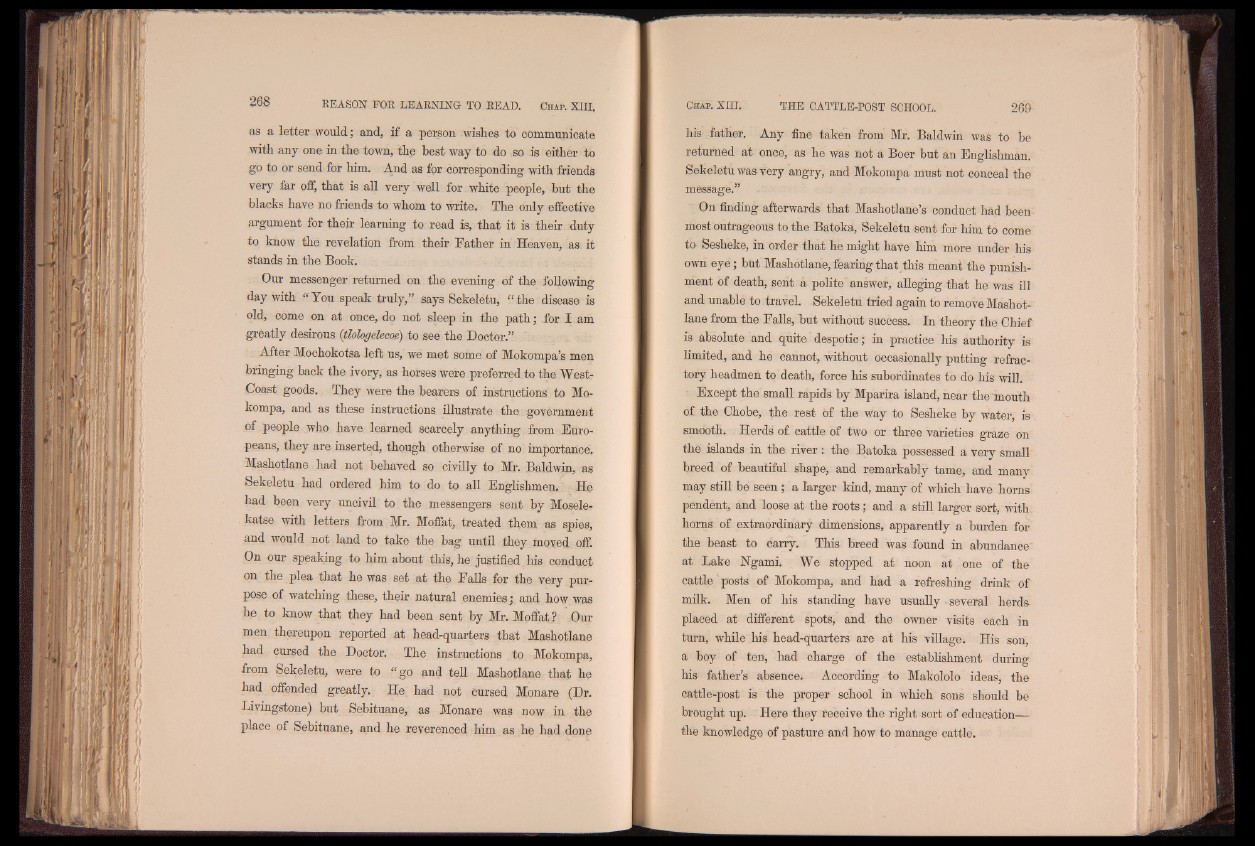
as a letter would; and, if a person wishes to communicate
■with any one in the town, the best way to do so is either to
go to or send for him. And as for corresponding with friends
very far off, that is all very well for white people, but the
blacks have no friends to whom to write. The only effective
argument for their learning to read is, that it is their duty
to know the revelation from their Father in Heaven, as it
stands in the Book.
Our messenger returned on the evening of the following
day with “ You speak truly,’’ says Sekeletu, “ theIdisease is
old, come on at once, do not sleep in the p a th ; for I am
greatly desirous (tlologelecoe) to see the Doctor.”
After Mochokotsa left us, we met some of Mokompa’s men
bringing back the ivory, as horses were preferred to the West-
Coast goods. They were the bearers of instructions to Mo-
kompa, and as these instructions illustrate the government
of people who have learned scarcely anything from Europeans,
they are inserted, though otherwise of no importance.
Mashotlane had not behaved so civilly to Mr. Baldwin, as
Sekeletu had ordered him to do to all Englishmen, He
had been very uncivil to the messengers sent by Mosele-
katse with letters from Mr. Moffat, treated them as spies,
and would not land to take the bag until they moved off.
On our speaking to him about this, he justified his conduct
on the plea that he was set at the Ealls for the very purpose
of watching these, their natural enemies; and how was
he to know that they had been sent by Mr. Moffat? Our
men thereupon reported at head-quarters that Mashotlane
had cursed the Doctor. The instructions to Mokompa,
from Sekeletu, were to “go and tell Mashotlane that he
had offended greatly. He had not cursed Monare (Dr.
Livingstone) but Sebituane, as Monare was now in the
place of Sebituane, and he reverenced him as he had done
his father. Any fine taken from Mr. Baldwin was to be
returned at once, as he was not a Boer but an Englishman.
Sekeletu was very angry, and Mokompa must not conceal the
message.1’
On finding afterwards that Mashotlane’s conduct had been
most outrageous to the Batoka, Sekeletu sent for him to come
to Sesheke, in order that he might have him more under his
own eye; but Mashotlane, fearing that this meant the punishment
of death, sent a polite answer, alleging that he was ill
and unable to travel. Sekeletu tried again to remove Mashotlane
from the Ealls, but without success. In theory the Chief
is absolute and quite despotic; in practice his authority is
limited, and he cannot, without occasionally putting refractory
headmen to death, force his subordinates to do his will,
Except the small rapids by Mparira island, near the 'mouth
of the Chobe, the rest of the Way to Sesheke by water, is
smooth. Herds of cattle of two or three varieties graze on
the islands in the river: the Batoka possessed a very small
breed of beautiful shape, and remarkably tame, and many
may still be seen; a larger kind, many of which have horns
pendent, and loose at the roots ; and a still larger sort, with
horns of extraordinary dimensions, apparently a burden for
the beast to carry. This breed was found in abundance
at Lake JSTgami. We stopped at noon at one of the
cattle posts of Mokompa, and had a refreshing drink of
milk. Men of his standing have usually several herds
placed at different spots, and the owner visits each in
turn, while his head-quarters are at his village. His son,
a boy of ten, had charge of the establishment during
his father’s absence. According to Makololo ideas, the
cattle-post is the proper school in which sons should be
brought up. Here they receive the right sort of education—
the knowledge of pasture and how to manage cattle.